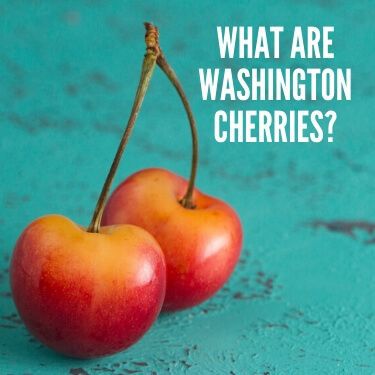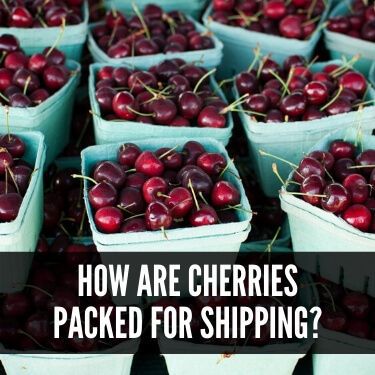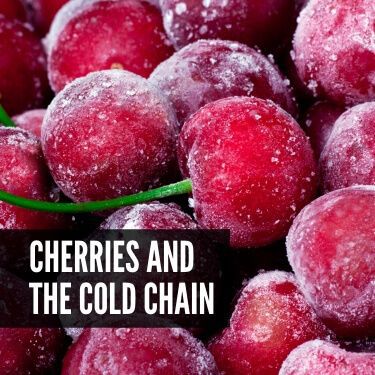If your company is in the fresh food industries, shipping cherries from Washington is a task that you’ll likely encounter at some point. After all, 70% of all commercially produced cherries come from just four states, and Washington is the chief supplier. Whether handling sweet or tart variants, Washington cherries must be transported with care and efficiency. An appreciation of regulations and logistics is essential for local companies and overseas importers alike. Failure to satisfy the demands will lead to negative outcomes for all parties involved.
Shipping cherries from Washington requires great care. The USDA provides recommended shipping conditions for all perishable goods including cherries. Their recommendations include a shipping temperature between 30 and 32°F and using a polyethylene bag liner. This ensures that cherries remain fresh and avoid contamination while in transit.
There are many other details to consider when shipping cherries from Washington. Our complete guide below provides you with all of the information you need.
While over 1,000 types of cherries are produced in the United States, only a small handful are actually grown on a commercial level. Alongside Oregon, Idaho, and Utah, Washington is one of the four main locations responsible for the nation’s cherry industry. In fact, growers in the Evergreen State grow over 270,000 tons of cherries every single year.
Washington is the number one producer of sweet cherries in the United States, with 245,000 tons equating to 95% of the market. Around 70% of all Washington cherries stay in the U.S. while 30% of exported cherries are primarily sent to Canada, as well as China and other Asian territories. A small percentage are sent to European countries too.
Given that the U.S. is the world’s third largest grower and supplier of commercial cherries, Washington cherries are among the most famous on the planet. Interestingly, their domestication predates recorded history. Washington cherry crops average around 65 cherries per pound while they also have the shortest period – around 60 to 75 days – between the point of flower blossom and harvest. Washington cherry season begins in April and lasts to around mid-September, underlining how quickly fresh cherries become perishable. This also confirms the need to transport and handle them to the very highest standards.

While Washington cherry growers are primarily known for sweet cherries, the Evergreen State produces several variants of both sweet and tart cherries. While the fresh options do dominate the market, canned and frozen goods are produced across the states cherry farms too. Washington cherries cover the three main types – dark red, red, and yellow – while all major commercially available cultivars in the U.S. can be found in this part of the country.
Rainier cherries are synonymous with Washington, having originated at Washington State University in 1952. They are characterized by their thin skin and thick creamy-yellow flesh while they are considered a premium cultivar. The plants begin to blossom after 3 to 5 years, with the harvest starting in early April. Taking their name after Mount Rainier, the cherries are seen as a cross between Van and Bing cherries.They are particularly sensitive to weather conditions such as high temperatures and rain, which is why they require great attention.
Other popularly grown varieties include;
Bing cherries are another commonly grown cultivar of the fruit in Washington. While also commonly grown in the other major cherry-growing states, the fact that Bing cherries are the most common type in North America means that tons are produced every season. The large, dark and firm cherries are almost always fresh rather than frozen or canned and are arguably the most suitable solution for long distance transportation, which makes them a key part of the cherry shipping market.
Cherries are just a small part of what Washington frequently ships to other states. To learn more about Washington's shipping profile, check out our page Shipping From Washington.
Not only do cherries have a shorter shelf life compared to other fruits, but they are also very delicate fruits. They can become bruised and blemished very quickly, which is why packing teams must be done with extra care and caution. In fact, no more than 15% of cherries used in cherry pies are allowed to be damaged. So, those dealing with packing protocols ahead of shipping fresh cherries need to be careful.
Packers reduce the threat of mechanical injuries through a process referred to as a “cold-chain”, which covers the processes of harvesting, packaging, and shipping to retailers and food companies. To take them from harvest to packing, packers transport cherries on a stream of water as to prevent bruising while nets are used to remove leaves and other debris. The cherries are subsequently put through a cluster cutter, which separates individual fruits by cutting the stems of clusters. This leaves the single cherries with a far shorter stem.
Individual cherries are sorted by size via a process that can be completed manually or through machinery. Once the cherries have been sorted, they are packed into boxes, clamshells, and bags of varying sizes before being added to cartons. The packers then load the cartons onto the freight trucks and other vehicles to begin their journeys to the client.

It’s worth noting that attention needs to be given in terms of what other perishable goods are shipped with cherries. Since cherries naturally produce ethylene gas, there’s a chance they can negatively affect other produce. For example, artichokes, lettuce, and broccoli can experience accelerated ripening which can lead to spoiling if they’re in confined contact with ethylene producing goods like cherries.
The full list of load compatibility groups is published in Appendix 2 of the FDA’s Protecting Perishable Foods During Transport by Truck.
Due to their delicate nature and susceptibility to temperature changes, cherry shipping processes must be tailored to prolong the life of the fruits. Keeping cherries cool will allow them to retain their aesthetic appeal as well as their sweet taste for far longer. This is especially crucial when handling international exports but is still vital for local cherry shipping and transportation. Inadequate storage during transit can severely harm the quality, resulting in FDA violations and unhappy consumers.
To manage the delicate Washington cherries, the fruits should undergo the following steps;
When suitably cooled, Washington cherries retain their delicious taste and will be protected from blemishes like bruising and cracking. In addition to gaining a maximized lifespan, it helps to reduce waste from needing to throw out spoiled individual fruits. While it does require extra effort, is it a crucial aspect for promoting optimal financial efficiency.
Washington cherries aren’t only grown in huge quantities, they are also harvested in a relatively short season. When combined with their low costs on a punnet by punnet basis, it’s imperative that cherries are shipped in an efficient manner. In most cases, retailers and major fruit distributors subsequently opt for cherry shipping by the truckload. The financial benefits of this approach are obvious while it also encourages added convenience throughout the cherry season.
Once cherries, both sweet and tart, have been through the packing processes they can be loaded in their cartons quickly thanks to the stackable nature. Cartons are protected by insulation that locks in the cold temperatures for the journey ahead. Meanwhile, distribution via the truckload ensures that cherries can be delivered to retailers and supermarkets throughout the west coast, as well as neighboring states and parts of Canada, with same day delivery. Long-haul deliveries, even to Asia, can be completed within a few days, which is quick enough to ensure the taste and nutritional benefits of the antioxidant properties are locked in. Delivering Washington cherries by the truckload also requires specialized refrigerated vehicles to support the low flesh temperatures provided by the insulated cartons.
While volumes will vary from one truck size to the next, truckload shipping carries dozens of cartons at any time, equating to several tons and tens of thousands of individual fruits. As long as cherries have been sorted and stored in the correct fashion, freights can include a combination of sweet and tart cherries covering various cultivars including Bing and Rainier cherries. For added convenience, cartons and pallets should be ready for removal via forklift or other machinery. This makes it easier to transfer to supermarket coolers or onto boats or freight flights for their onward journeys.

The short answer to this question is yes, but retailers and other food industry businesses will desire further detail. Washington cherries are more susceptible to skin damage and taste profile changes than most fruits. For this reason, extra care must be taken to ensure that the right protocols are followed at every step of the distribution process. The scientific research shows that reducing temperatures to below 41° F within four hours is merely a starting point. If the temperatures are allowed to creep up during transportation, fresh cherries of all varieties can become ruined, causing a loss of edible foods and – consequently – money. Trucks with regulated refrigeration features are an essential component of successful cherry shipments. Carton insulation through expanded polystyrene (EPS) foam, rigid polyurethane foam, or radiant barrier films help keep temperatures down. Nevertheless, temperature controlled shipping relies heavily on the regulated temperatures of the vehicles themselves.
Not all shipments require temperature control, and identifying perishable goods is a vital step that needs to precede completing any logistical elements. However, Washington cherries of all types fall into this category. Freight trucks can be kept cold through the use of dry ice or gel coolants. When cartons are suitably insulated, the gel coolants are usually the best option, particularly as dry ice can be considered hazardous and can add a degree of difficulty and confusion for IATA compliance. Washington cherries are among the most delicate fruits of all, though, which is why the intricacies of freight climate control must be adhered to at all times. It’s the only way to ensure that shipping cherries will benefit from optimal care and handling at all times.
The cold chain is an integral feature of the harvest, packaging, and distribution process. While growers may achieve the results using slightly contrasting methods – manual or automated – the outcomes are the same. The cold chain keeps Washington cherries at the right temperature from the moment they are picked to the moment they arrive at their final destination.
A cold chain sets out to ensure efficiency of time, money, and produce. It does this by:

The cold chain is a process that affects cherry shipments more than most, and is a necessity for transporting Washington cherries in large quantities regardless of whether they are moving to a local reseller or being shipped internationally. Whether supported by machinery and manual packing processes, the quality of the final deliveries rely heavily on this process. Only the best will do.
When you need to get Washington cherries from the farm to the shelves – or commercial kitchen – the use of refrigerated transportation is the only answer. R+L Global Logistics appreciates the need for a reliable freight transportation company that is tailored to your specific needs. Our fleet of temperature controlled trucks keep your cartons of delicious Washington cherries in perfect condition throughout every step of the journey. Moreover, with vehicles of varying sizes, we arrange for the most practical and cost-effective solution for your requirements.
Our temperature controlled trucks use reliable refrigeration facilities through coolant gels that produce consistent temperatures, keeping your Washington cherries stored at the ideal temperature throughout their journey. This aids in preventing spoiled foods either aesthetically or in regards to taste profiles. The trucks are also secured for optimal protection while our experienced drivers are sure to get your shipment to the intended destination in the desired time regardless of whether they’re set for the dock, airport, or supermarket.
Our team of professional shippers can handle all fresh, frozen, and canned Washington cherries. The advanced on-board temperature control facilities allow drivers to maintain a winning environment without leaving the driver’s seat while notifications ensure that instant action is taken should any issues or changes surface during transit. R+L Global Logistics is dedicated to using the best vehicles and equipment while also going the extra mile to provide transparent communication.
Whether you’re a Washington-based cherry growing farm that needs help getting produce out to clients, or a retailer that needs their produce to arrive in the best health, we’re here to serve you. The logistics of transporting cherries doesn’t need to cause headaches and ongoing dilemmas. Our experience in handling fragile freight including cherries ensures that you won't have to worry about the integrity of your goods.
When handling fruit, it’s vital that you take extra care during these processes. However, you don’t want it to stand in the way of productivity elsewhere in the venture. Shipping cherries with R+L Global Logistics removes the strain, allowing you to focus on the sweet taste of success. Our convenient, affordable, and – crucially – reliable services will ensure that your goods are handled with optimal care from the moment we load cartons onto the truck to the moment they reach their destination. Whether you're shipping from Washington to California or anywhere else, we'll get the job done for you.
To learn more about our refrigerated freight shipping service or to request a freight shipping quote, give us a call at (866) 353-7178 or click “freight quote” below. Our team of transportation and logistics specialists are ready to serve you.
R+L Global Logistics
315 NE 14th St., Ocala, FL 34470